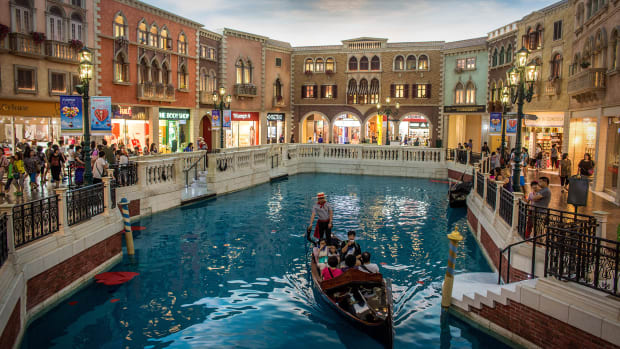Las Vegas has seen its share of scoundrels and people of questionable morality own casinos. The city more or less rose to prominence as a mafia playground where backroom leg breakers and other shady characters once held the day.
That influence subsided as major players including Caesars Entertainment (CZR) and MGM Resorts International (MGM) became dominant in the desert city. That does not mean Las Vegas lacks its share of modern-day villains (albeit of the political type, not the criminal kind).
Before his death a little over a year ago, Las Vegas Sands (LVS) Founder Sheldon Adelson courted his share of controversy. Adelson served as a Republican operator and kingmaker. Rolling Stone explained his importance in a piece after his death.
It was a ritual of the modern Republican Party. House and Senate hopefuls locked in a tough reelection fight, outside consultants who wanted to refill their campaign coffers, presidential wannabes who dreamt of being the next commander-in-chief — they all made the pilgrimage to Las Vegas, and specifically to the personal office of the billionaire casino mogul Sheldon Adelson. They made sure on their way in to avoid stepping in any excrement left behind by Adelson’s secretary’s dog. And they made even more sure to kiss the ring of arguably the GOP’s biggest rainmaker, the ruddy-faced and pugilistic Adelson, a mega-donor who wielded extraordinary influence in the Republican Party and who reshaped American politics.
Adelson had power and he wielded it by donating hundreds of millions to political action committees that supported his agenda. (When he died, his fortune was estimated at $35 billion.)
"Anybody who stands up to him or stands in his way, he'll try to crush," D. Taylor, international president of the labor group Unite Here and a longtime labor leader in Las Vegas, told NPR.
That power also kept his relatively small casino (compared with multiproperty Vegas operators Caesars and MGM) competitive in an incredibly difficult market.
Now, with Adelson no longer with us, his company has moved closer to selling its signature Las Vegas property.

Chris McGrath/Getty Images
Casino Sale Not Without Controversy
Las Vegas Sands has agreed to sell its Las Vegas real property and operations, including the Venetian Resort Las Vegas and the Sands Expo and Convention Center, for $6.25 billion to a combination of companies.
VICI Properties Inc. (VICI) said it would purchase the land and real estate assets associated with the Venetian Resort and the Sands Expo and Convention Center for $4 billion in cash.
A second company. the private-equity firm Apollo Global Management, (APO) will acquire the operating company of the Venetian Resort for $2.25 billion. Apollo itself has seen its share of controversy.
"Nevada regulators are considering the transaction as controversy swirls at the top of Apollo. In a rift that has Wall Street enthralled, co-founders Leon Black and Josh Harris are engaged in a power struggle with the former accusing the latter of waging a 'coup and smear campaign,' according to legal documents filed last month," Casino.org reported.
Despite those issues, the Nevada Gaming Control Board "unanimously signed off on Apollo Global Management’s purchase of the Venetian, Palazzo and Venetian Expo, indicating one of the largest Las Vegas Strip asset sales announced in 2021 is closer to wrapping up."
Sands Shifts Its Focus to Macau and Singapore
Las Vegas has become dominated by megaoperators Caesars and MGM. The two giants control a large part of the Las Vegas Strip and their sheer size makes competing a challenge even with a property as storied as the Venetian. Now, Sands has turned its attention to its properties in Macau and Singapore.
"This company is focused on growth, and we see meaningful opportunities on a variety of fronts," Chief Executive Robert Goldstein said in a news release.
"Asia remains the backbone of this company and our developments in Macau and Singapore are the center of our attention. We will always look for ways to reinvest in our properties and those communities."
That does not mean, however, that Sands has abandoned any plans it may have in the U.S.
"There are also potential development opportunities domestically, where we believe significant capital investment will provide a substantial benefit to those jurisdictions while also producing very strong returns for the company," he said.







